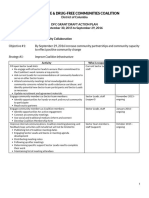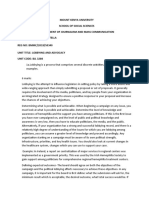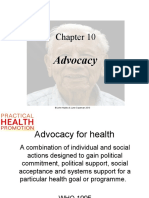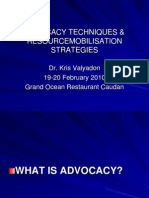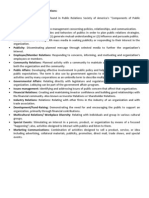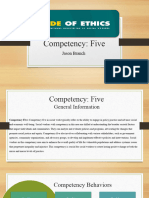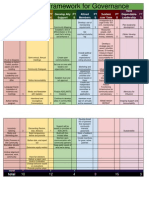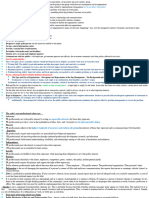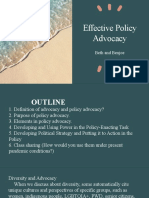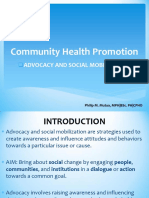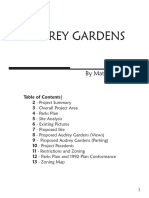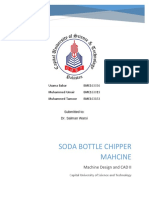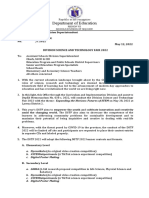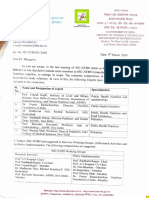Strategies For Successful Public Policy Advocacy: Stephanie Smith Lee
Strategies For Successful Public Policy Advocacy: Stephanie Smith Lee
Uploaded by
Icia Carranza CasOriginal Description:
Original Title
Copyright
Available Formats
Share this document
Did you find this document useful?
Is this content inappropriate?
Copyright:
Available Formats
Strategies For Successful Public Policy Advocacy: Stephanie Smith Lee
Strategies For Successful Public Policy Advocacy: Stephanie Smith Lee
Uploaded by
Icia Carranza CasCopyright:
Available Formats
Strategies for Successful Public Policy Advocacy
Stephanie Smith Lee
Getting Started
Work with a non-profit, non-partisan group
Start a governmental affairs committee for your group
Organize and mobilize networks and coalitions
Identify areas of agreement and priority for action
Develop a strategic plan
Getting Clear about what to do
Carefully research the issue
Clearly identify needed action: draft legislative/policy language if necessary
Frame the debate in positive terms
Learn the policy process and identify key policy makers and “champions”
Taking Action
Prepare fact sheets/position papers outlining the issue, background and needed action (keep updated)
Use NDSC info bulletins/fact sheets/alerts on national issues
Prepare clear, concise action alerts and distribute
Maintain/use social media, Facebook groups, email lists or other internet groups and websites, but
remember importance of personal contacts
Involve and mobilize self-advocates, parents, family members, professionals
Contact policy makers (visits, letters, calls, testimony, rallies)
Tie personal stories to the policy objective
Testify at hearings, request additional hearings, speak at committee meetings, town hall meetings
Building Relationships with Policy Makers on an Ongoing Basis
Remember to be bipartisan!
Divide and conquer – divide up who will be key contact for each policy maker
Get to know individual policymakers in both political parties
Invite them to “Walks” or other fundraisers, picnics, events – ask them to speak, say a few words, or
at least recognize their attendance
Take their photo with your group and share the photos with the media and on social media
Speak with them at community events
Get to know staff as well
Become a resource: develop long-term relationships
Building Support through media coverage
Press releases, requests for media coverage of events, after-event info, use social media
Letters to the editor, op-ed pieces
Share photos, testimony, letters to policymakers, and info about your policy efforts with media/on
social media
Personal contacts with media – become a source
Follow-up
Sometimes success is incremental – go the next mile
When a law is passed, that’s just the first step – next are regulations, policy guidance, implementation
Say thank you with a press release, letters to the editor, letters to policymakers, personal contacts
Copyright @Stephanie Smith Lee 2011
Permission is given to reproduce this document as long as it is reproduced in full with attribution.
You might also like
- Beyond Technique - Painting With Passion - Alvaro CastagnetDocument133 pagesBeyond Technique - Painting With Passion - Alvaro Castagnetra5kl92% (38)
- Public Policy and Program Administration 01.16.2023Document68 pagesPublic Policy and Program Administration 01.16.2023gabby watty100% (1)
- Political AnalysisDocument7 pagesPolitical AnalysisjunzNoch keine Bewertungen
- Art Appreciation Final Completion MechanicsDocument3 pagesArt Appreciation Final Completion MechanicsIcia Carranza CasNoch keine Bewertungen
- Toyota Success RecipeDocument7 pagesToyota Success Recipeapi-3740973Noch keine Bewertungen
- Bản sao của Civil Society - Lecture 9 - Policy lobby and advocacyDocument49 pagesBản sao của Civil Society - Lecture 9 - Policy lobby and advocacyNguyên VươngNoch keine Bewertungen
- Lecture 3 Advocacy A Tools For Community NetworkingDocument18 pagesLecture 3 Advocacy A Tools For Community NetworkingAbubakar GafarNoch keine Bewertungen
- Forms of Civic ParticipationDocument2 pagesForms of Civic Participationapi-234727365Noch keine Bewertungen
- Emp 100 CSL - Section Ii Advocacy and LobbyingDocument10 pagesEmp 100 CSL - Section Ii Advocacy and Lobbyingbenedictangwenyi7Noch keine Bewertungen
- 8 Steps To Good AdvocacyDocument3 pages8 Steps To Good AdvocacyMartinus SitanggangNoch keine Bewertungen
- Public Policy AdvocacyDocument23 pagesPublic Policy AdvocacyNONI ZERIMAR100% (1)
- Advocacy: Strategize & Organize For Change!Document41 pagesAdvocacy: Strategize & Organize For Change!Jarrah BrillantesNoch keine Bewertungen
- Ward 7 Safe & Drug-Free Communities Coalition DFC Action Plan 1516 FinalDocument5 pagesWard 7 Safe & Drug-Free Communities Coalition DFC Action Plan 1516 FinalW7SDCCNoch keine Bewertungen
- BJL 3208 Lobbying and Advocacy CatDocument7 pagesBJL 3208 Lobbying and Advocacy CatestherNoch keine Bewertungen
- Advocacy 2018-1Document44 pagesAdvocacy 2018-1Ayoade opeyemiNoch keine Bewertungen
- Concept of Development AdministrationDocument9 pagesConcept of Development AdministrationBeverly A. CannuNoch keine Bewertungen
- Understanding Public Policy PDFDocument5 pagesUnderstanding Public Policy PDFBrandon McintoshNoch keine Bewertungen
- Advocacy and LobbyingDocument13 pagesAdvocacy and Lobbyingsiddiqueeluqman100% (1)
- Advocacy: © John Hubley & June Copeman 2013Document12 pagesAdvocacy: © John Hubley & June Copeman 2013qwerty123Noch keine Bewertungen
- ADVOCACYDocument15 pagesADVOCACYRhoda Fe SalenNoch keine Bewertungen
- DV OrganizationDocument3 pagesDV Organizationsumiyashaheer97Noch keine Bewertungen
- Activist Tool KitDocument16 pagesActivist Tool KitAnonymousNoch keine Bewertungen
- Advocacy Techniques & Resourcemobilisation StrategiesDocument17 pagesAdvocacy Techniques & Resourcemobilisation StrategiesVidya CharanNoch keine Bewertungen
- Adovacacy and Social IssuesDocument2 pagesAdovacacy and Social Issuesiltamasriasat123Noch keine Bewertungen
- Unit OneDocument41 pagesUnit Onejnassoro46Noch keine Bewertungen
- Public Policy AdvocacyDocument5 pagesPublic Policy AdvocacyWilliam SabadoNoch keine Bewertungen
- PRSADocument1 pagePRSARaheel ShaikhNoch keine Bewertungen
- Straight To The Point Assessing The Political Environment For AdvocacyDocument8 pagesStraight To The Point Assessing The Political Environment For Advocacyacl1landoyNoch keine Bewertungen
- Policy AdvocacyDocument7 pagesPolicy AdvocacyWajahat GhafoorNoch keine Bewertungen
- Module4 - Public Policy and Program AdministrationDocument10 pagesModule4 - Public Policy and Program AdministrationChristian Damil-Tobilla100% (2)
- Agriculture Advocacy Community of Practice MeetingDocument4 pagesAgriculture Advocacy Community of Practice Meetingliving businesseducationNoch keine Bewertungen
- PS 103: Philippine Public Administration: What Are Policies, Politics, and Administration?Document10 pagesPS 103: Philippine Public Administration: What Are Policies, Politics, and Administration?Tristan Jade Corpuz Valdez100% (1)
- Guide To Doing A Stakeholder AnalysisDocument5 pagesGuide To Doing A Stakeholder AnalysisAkol AbrahamNoch keine Bewertungen
- Analyzing Social Policy: Multiple Perspectives for Critically Understanding and Evaluating PolicyFrom EverandAnalyzing Social Policy: Multiple Perspectives for Critically Understanding and Evaluating PolicyNoch keine Bewertungen
- Competency 5 PowerpointDocument13 pagesCompetency 5 Powerpointapi-693321754Noch keine Bewertungen
- Eight Elements of A Program PlanDocument8 pagesEight Elements of A Program Planpakshal19Noch keine Bewertungen
- GovSemS14 1Document15 pagesGovSemS14 1Jose Ramon HernandezNoch keine Bewertungen
- Individual Prep For Interest Group Speed Dating Mini-ProjectDocument2 pagesIndividual Prep For Interest Group Speed Dating Mini-ProjectRaven H.Noch keine Bewertungen
- Communicating Effectively 0Document50 pagesCommunicating Effectively 0Michel BosmanNoch keine Bewertungen
- Current Issues HardDocument5 pagesCurrent Issues HardleoleicristinorNoch keine Bewertungen
- A Step by Step Guide To Creating A Media StrategyDocument8 pagesA Step by Step Guide To Creating A Media StrategyAaron LifordNoch keine Bewertungen
- Assignment 2Document3 pagesAssignment 2emmamarymay9Noch keine Bewertungen
- Social AdvocacyDocument12 pagesSocial AdvocacyAnjali PathakNoch keine Bewertungen
- Governance Committee Framework - Feb 2013Document2 pagesGovernance Committee Framework - Feb 2013DetroitADELANTENoch keine Bewertungen
- Sts Advocacy Plan Pollution DraftDocument4 pagesSts Advocacy Plan Pollution DraftJan YambaoNoch keine Bewertungen
- How Pressure Groups OperateDocument11 pagesHow Pressure Groups OperateDaniela RusuNoch keine Bewertungen
- Social Policy DevelopmentDocument27 pagesSocial Policy DevelopmentJeshella RoxasNoch keine Bewertungen
- Literary - Theory - A PppppuDocument9 pagesLiterary - Theory - A Pppppubrucknasu279Noch keine Bewertungen
- Effective Policy AdvocacyDocument49 pagesEffective Policy AdvocacyBen-joe Capacio RonoloNoch keine Bewertungen
- 2 - Health Care Politics in Nursing...Document18 pages2 - Health Care Politics in Nursing...فيصل الاعرجNoch keine Bewertungen
- Interest or Pressure GroupsDocument3 pagesInterest or Pressure GroupsCryslerNoch keine Bewertungen
- IDEOLOGY: An Organized Set of Beliefs Concerning Social Goals and The BestDocument9 pagesIDEOLOGY: An Organized Set of Beliefs Concerning Social Goals and The BestDaniel KibbeNoch keine Bewertungen
- Part 3. The Free South Africa Movement and Anti-Apartheid Legislative Change in The United States 1 .3Document2 pagesPart 3. The Free South Africa Movement and Anti-Apartheid Legislative Change in The United States 1 .3Stewart MillsNoch keine Bewertungen
- The Art of PersuasionDocument7 pagesThe Art of PersuasionEkkAcEkka2332Noch keine Bewertungen
- A Handbook For Advocates: "If Not Us, Who? If Not Now, When?"Document22 pagesA Handbook For Advocates: "If Not Us, Who? If Not Now, When?"Roxanne ReevesNoch keine Bewertungen
- Advocacy Action Kit 2018Document37 pagesAdvocacy Action Kit 2018Umar DarNoch keine Bewertungen
- Advocacy and Social Mobilization - Lec 1-10Document52 pagesAdvocacy and Social Mobilization - Lec 1-10Philip MutuaNoch keine Bewertungen
- Forces in The PolicyDocument3 pagesForces in The PolicyNew MoviesNoch keine Bewertungen
- Work For Class 2Document2 pagesWork For Class 2api-324581059Noch keine Bewertungen
- 6-EventPlanning Thru Public SpeakingDocument3 pages6-EventPlanning Thru Public Speakingamitrao1983Noch keine Bewertungen
- Transformative Local Advocacy Funky CitizensDocument5 pagesTransformative Local Advocacy Funky CitizensAlexandra GrecuNoch keine Bewertungen
- The One-Hour Activist: The 15 Most Powerful Actions You Can Take to Fight for the Issues and Candidates You Care AboutFrom EverandThe One-Hour Activist: The 15 Most Powerful Actions You Can Take to Fight for the Issues and Candidates You Care AboutRating: 4 out of 5 stars4/5 (1)
- Message Matters: Succeeding at the Crossroads of Mission and MarketFrom EverandMessage Matters: Succeeding at the Crossroads of Mission and MarketNoch keine Bewertungen
- Challenges and Coping Strategies For Enhancing The Effectiveness of Distance Learning in Achieving Business Education ObjectivesDocument8 pagesChallenges and Coping Strategies For Enhancing The Effectiveness of Distance Learning in Achieving Business Education ObjectivesIcia Carranza CasNoch keine Bewertungen
- Behaviors PDFDocument4 pagesBehaviors PDFIcia Carranza CasNoch keine Bewertungen
- SolicitationDocument1 pageSolicitationIcia Carranza CasNoch keine Bewertungen
- NVM Gonzales: Brief BiograpghyDocument24 pagesNVM Gonzales: Brief BiograpghyIcia Carranza CasNoch keine Bewertungen
- Audrey Gardens: by Matt BuckerDocument13 pagesAudrey Gardens: by Matt BuckerIcia Carranza CasNoch keine Bewertungen
- Monthly Project Progress Meeting Agenda: Turn Off All Cell PhonesDocument1 pageMonthly Project Progress Meeting Agenda: Turn Off All Cell PhonesIcia Carranza CasNoch keine Bewertungen
- Mental Disorder/ Psychiatric DisorderDocument3 pagesMental Disorder/ Psychiatric DisorderIcia Carranza CasNoch keine Bewertungen
- Montgomery County PPP Loan RecipientsDocument29 pagesMontgomery County PPP Loan RecipientsBethesda MagazineNoch keine Bewertungen
- Brochure - M Series en - Pompa OBLDocument6 pagesBrochure - M Series en - Pompa OBLAmrina RosyadaNoch keine Bewertungen
- 0580 w14 QP 42Document20 pages0580 w14 QP 42Bobby SNoch keine Bewertungen
- Giving Safe Injections: A Guide For Nurses and Others Who Give InjectionsDocument43 pagesGiving Safe Injections: A Guide For Nurses and Others Who Give Injectionsanon_21114707Noch keine Bewertungen
- Chipper Final Report PDFDocument14 pagesChipper Final Report PDFUsama BabarNoch keine Bewertungen
- Project Management A Managerial Approach 9th Edition Meredith Solutions ManualDocument29 pagesProject Management A Managerial Approach 9th Edition Meredith Solutions Manualhannahmillerosdbrmngqy100% (33)
- The Flatliners - The Great AwakeDocument118 pagesThe Flatliners - The Great AwakeAntonio Salazar Marrufo100% (1)
- Senate Hearing, 107TH Congress - Unleashing The Power of Entrepreneurship: Stimulating Investment in America's Small BusinessesDocument227 pagesSenate Hearing, 107TH Congress - Unleashing The Power of Entrepreneurship: Stimulating Investment in America's Small BusinessesScribd Government DocsNoch keine Bewertungen
- DSTF 2022 MemoDocument2 pagesDSTF 2022 MemoAlbert Corsame UmbacNoch keine Bewertungen
- Elgin Rumble Bluetooth Earbuds Quick Start Guide 20210316 v1Document10 pagesElgin Rumble Bluetooth Earbuds Quick Start Guide 20210316 v1victor corderoNoch keine Bewertungen
- Area of Triangle PDFDocument4 pagesArea of Triangle PDFMana GargiNoch keine Bewertungen
- (Guide) (Fat32) (Ext4) (Swap) (2 PDFDocument10 pages(Guide) (Fat32) (Ext4) (Swap) (2 PDFisrael999Noch keine Bewertungen
- Efficient Net B0Document4 pagesEfficient Net B0NavyaNoch keine Bewertungen
- Mergers Acquisitions July 2023Document2 pagesMergers Acquisitions July 2023Eileen ChepchumbaNoch keine Bewertungen
- Money Markets ReviewerDocument4 pagesMoney Markets ReviewerHazel Jane EsclamadaNoch keine Bewertungen
- AFU Book LibraryDocument278 pagesAFU Book Libraryakylla8599Noch keine Bewertungen
- Letter To DR BhargavaDocument2 pagesLetter To DR BhargavaDeepak GautamNoch keine Bewertungen
- Restricted Earth-Fault (REF) Protection Challenges Due To Extensive Use of Cables: A Case StudyDocument6 pagesRestricted Earth-Fault (REF) Protection Challenges Due To Extensive Use of Cables: A Case StudyСергей КозловNoch keine Bewertungen
- British GQ November 2017Document414 pagesBritish GQ November 2017crobelo7Noch keine Bewertungen
- Aortic RegurgitationDocument14 pagesAortic RegurgitationFahd HatemNoch keine Bewertungen
- A51-Encryption AlgorithmDocument43 pagesA51-Encryption AlgorithmRahul Garg100% (1)
- AIRMAN SDG125S 8B1 SDG Parts Catalog Engine Generator BTWDocument33 pagesAIRMAN SDG125S 8B1 SDG Parts Catalog Engine Generator BTWEd DugganNoch keine Bewertungen
- Pintxos Bar GauchoDocument122 pagesPintxos Bar GauchoVesela Lazarova LazarovaNoch keine Bewertungen
- ECIL Technical Officer Recruitment 2023 NotificationDocument3 pagesECIL Technical Officer Recruitment 2023 NotificationLucasNoch keine Bewertungen
- Exercise Problems On DC GeneratorsDocument2 pagesExercise Problems On DC GeneratorsSyed Arif Ahmed0% (1)
- Open School Installation GuideDocument16 pagesOpen School Installation GuidepalosotNoch keine Bewertungen
- Smic - DCF & Computations - de Asis - Gomez - TriviñoDocument47 pagesSmic - DCF & Computations - de Asis - Gomez - TriviñoDiana De AsisNoch keine Bewertungen












